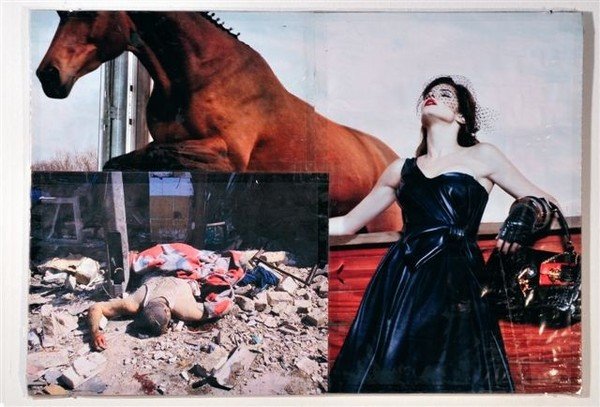Thomas Hirschhorn
dal 4/12/2008 al 18/1/2009
Segnalato da
4/12/2008
Thomas Hirschhorn
Susanna Kulli, Zurich
"An Ur-Collage is a simple, primitive, prehistoric collage. I want to make collages that are evidence in themselves. I want to give form to the origin (ur-spring) of a collage. They are called Ur-Collage because they are original collages; I would not like to be able to make any simpler collage." (T.Hirschhorn)

An «Ur-Collage» is a simple, primitive, prehistoric collage. I want to make collages that are
evidence in themselves. I want to give form to the origin (ur-spring) of a collage. They are
called «Ur-Collage» because they are original collages; I would not like to be able to make
any simpler collage. The obvious feature of an «Ur-Collage» consists in its creating a new
world from only two elements of the existing world. These two elements or images are
printed matter, and it is that which associates the two images, namely, that they are printed
matter. One of the elements of printed matter is a double-page advertisement, and the other
element is an image printed out on a home printer. I don’t say that this latter image, the
picture of a dead, destroyed person, comes from the internet as if it came from another
world, because this image is also of this world. The one image is not accused, and the other
is not accusing; rather, I want to connect the two images with one another, to bring them
together; I want to glue them together into a new worldview.
What connects the two elements
before I have glued them together is that they are both images of the existing world
surrounding me. They are elements, images of our undivided world, of our only world.
I live in this complex, chaotic, cruel, beautiful and wonderful world. I want to be happy in it
and I want my work to reflect that. The «Ur-Collage» is a basis for this. I affirm the world in
which I live and I want to affirm also the negative side of this world. I affirm the world in which
negativity is also shown and in which the hard core of reality, of negativity is not bracketed
off. I want to show also this hard core. I want to turn toward the negative; I do not want to be
a cynic or a cunning devil. I do not want to look away; I do not want to turn away and I do not
want to be overly sensitive. I want to be attentive and I want to create a new world alongside
and in the existing world. I want to do this with «Ur-Collage». It shows that; it asserts that;
and it defends that. The «Ur-Collage» is the form of this newly created world. To make an
«Ur-Collage» means to be in agreement with the world. To be in agreement does not mean
to approve. To be in agreement means to look. To be in agreement means to not turn away.
To be in agreement means to resist, to resist the facts.
An «Ur-Collage» is not information, not journalism, not commentary. An «Ur-Collage»
creates a truth and I am concerned with giving a form to this truth. The «Ur-Collage» wants
to create a new truth.
I love making collages. It is something fundamental for me, something essential. I love the
collages of John Heartfield, Hannah Höch, Kurt Schwitters and, more than anything, the
three-dimensional «Grosses-Plasto-Dio-Dada-Drama» by Johannes Baader. I make twodimensional,
and also three-dimensional collages. I always proceed from two dimensions.
What is important is that I always proceed from the two dimensions of a collage, even when
the work is spatial. I never proceed from the space or the architecture.
It is simple to make a collage, and it can be done quickly. It is fun to make a collage and at
the same time it arouses suspicion: it is too simple, too fast. For many it is not respectable
enough and many label it as immature. And so, collages are mostly done at youth. But a
collage is resistant; it escapes control, even the control of the one who made it. That is its
resistant character. To make a collage always has something to do with headlessness.
Precisely that is what interests me because there is no means of expression with such great
explosive power. A collage is charged and it always remains explosive. In the case of a
collage it holds true that I – as an artist – often stand dumbstruck before it, but it is precisely
a matter of enduring this ‘looking dumb’. There is no technique more common throughout the
world than the collage – almost everybody has done a collage sometime in their lives. That is
the associative element of a collage, that almost everybody, sometime in their lives, has tried
to make an image of this world. A collage is something universal and it is an opening toward
a non-exclusive public.
Thomas Hirschhorn, Aubervilliers, fall 2008
Translated from the German by Dr Michael Eldred, artefact text & translation, Cologne
Opening december 5, 2008
Galerie Susanna Kulli
Dienerstrasse 21, CH-8004 Zürich
Free admission



